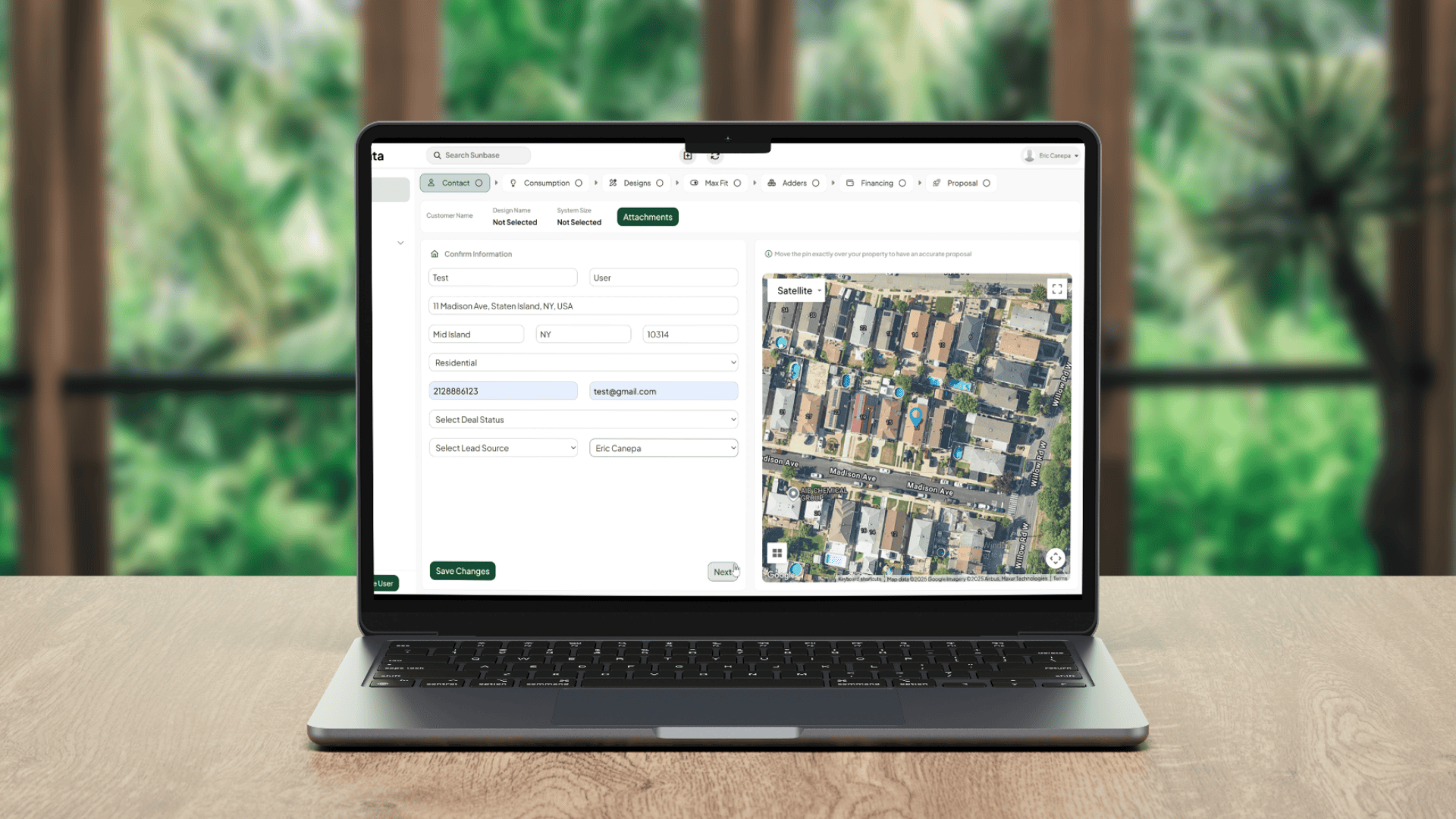January 17, 2025
Today, turning sunlight into electricity is easier! But how do we transform leads into loyal customers? Now that’s a bit trickier.
Even if renewable energy is becoming increasingly popular, many homeowners are still unsure who to believe, what options to select, and whether the investment is worthwhile.
The main test for companies: How can you target the proper audience, build credibility, and break the clutter?
Let's explore some contemporary solar marketing challenges you may encounter and discover proven strategies for connecting with more prospects, building a strong reputation, and fostering growth in this energetic industry.
The Biggest Solar Marketing Challenges and How to Fix Them
Marketing solar energy isn’t just about panels and power; it’s about people, trust, and timing. From high lead costs to complex customer journeys, solar companies face numerous challenges that can hinder their results.
But with the right strategy and tools, like Sunbase, you can turn obstacles into opportunities. This guide explores the top solar marketing challenges and how to conquer them with confidence, clarity, and a touch of creativity.
Key Takeaways
- Regulatory frameworks, competitive dynamics, and changing market trends present particular obstacles for solar enterprises.
- Success relies on differentiation. Distinctive value propositions, specialty marketing, and a strong brand presence help solar businesses thrive.
- It is essential to inform customers about solar technology, its advantages, and available incentives.
- Marketing effectiveness improves by leveraging modern tools like Sunbase Solar Software.
Understanding the Complex Solar Marketing Landscape
Marketing is the foundation of any successful brand, organization, or cause. It involves determining what customers need, how your product might meet that need, and crafting a message to encourage purchases.
> Current Trends in Solar Marketing
Traditional sales techniques frequently demand travel, printed materials, and other environmentally
negative actions.
But what exactly does this sound like? One could argue that this contradicts the solar industry's ecologically conscious message.
Digital marketing enhances sustainability by reducing dependence on physical resources, aligning with the solar industry's eco-friendly principles.
> Impact on Key Players in the Market
The growing solar energy industry is not without its competitors. The fact that every brand has something unique to offer!
Solar companies are always trying to provide the most affordable solutions while simultaneously improving their technological capabilities as more and more players enter the market.
This fierce competition has a huge impact on market shares, pricing strategies, and company structure. While it can drive innovation, it can also make it tricky for businesses to establish their positions, which could slow down industry growth.
> Key Statistics
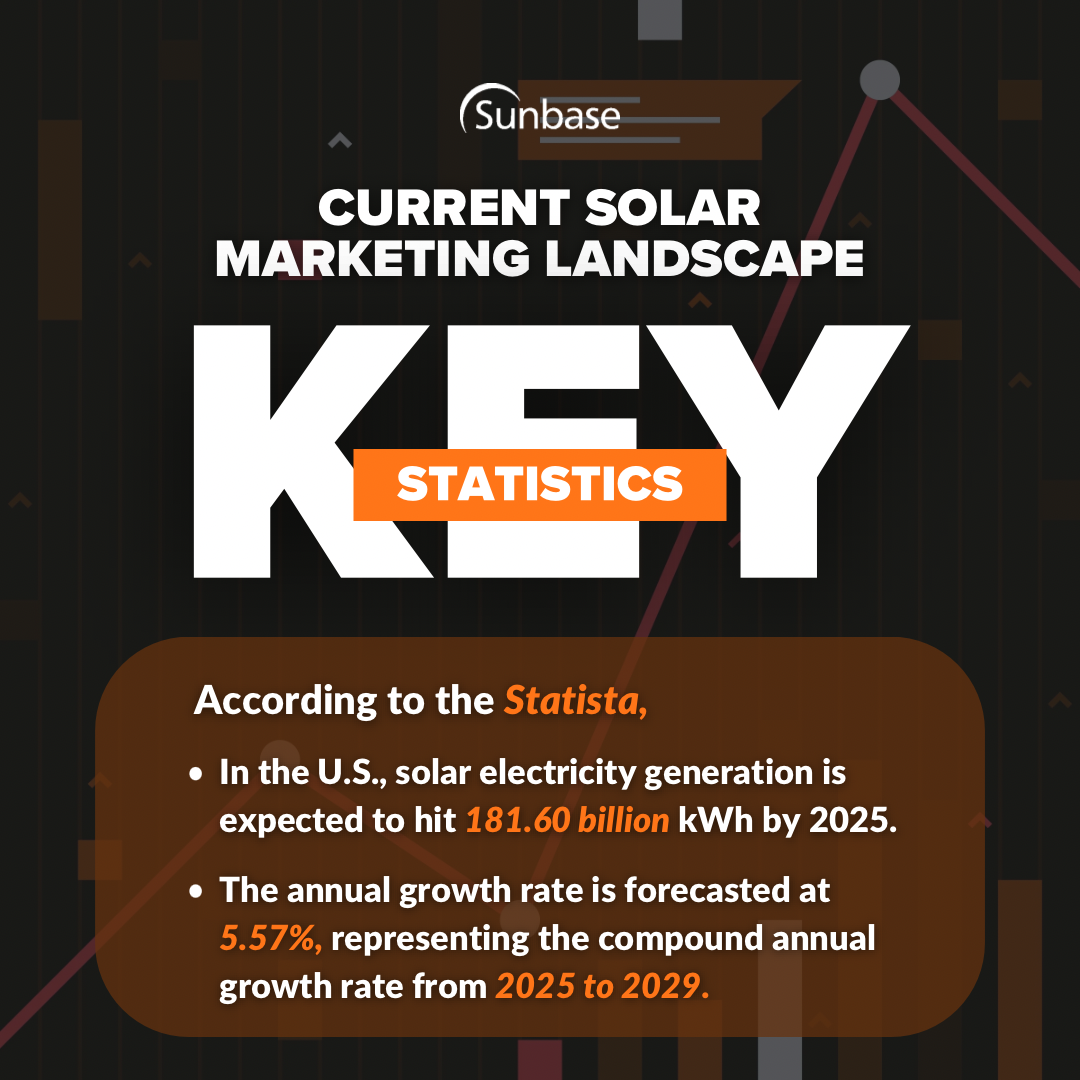
According to Statista,
- The US solar energy sector is expected to generate 181.60 bn kWh of power by 2025.
- The projected annual growth rate is 5.57%, based on the compound annual growth rate (CAGR) for 2025–2029.
In today’s bustling solar market, it can feel challenging to be noticed and earn the trust of potential customers, but it’s definitely worth the effort!
Enhancing Solar Marketing with AI-Powered Video Content
Let’s face it—video content is no longer optional in solar marketing. Whether it’s explaining how your system works or showing off a recent install, videos are one of the easiest ways to grab attention and build trust. But creating them? That’s where things often get tricky.
Not every team has the time, tools, or budget to shoot, edit, and voice professional-quality videos regularly. That’s where a bit of AI magic can help. Tools like AI video creator make it easier to put together polished, engaging clips without needing a full production setup.
And if you’re not a fan of recording your own voiceovers (or just want something that sounds super clean), you can use AI voice generators to add smooth, professional narration to your videos in a few clicks.
It’s a great way to keep your content sharp, clear, and consistent—without stretching your team too thin.
Top 6 Solar Marketing Hurdles and How to Conquer Them

Let's dive in!
Challenge #1: High Competition and Market Saturation
Here's the reality of a crowded market and why standing out is tougher than ever:
When there is a lot of competition for the same limited group of clients, it can be tough to maintain
healthy profit margins and grow quickly.
This is especially true in areas where solar energy has already become quite popular. The solar sector has historically shown signs of saturation, particularly in the developed regions, highlighting the critical need for innovative strategies to sustain growth.
How to Overcome?
> Differentiation with unique value propositions and branding
Setting oneself apart from the competition in a saturated market makes the difference. Offering something special that your rivals don't have is one method to do this.
This could be an amazing feature, service, or product. It may also be a new strategy for customer service or marketing. Make sure it's something that makes you stand out, such as:
- Are you an expert in industrial, residential, or community solar projects?
- Do you provide cutting-edge solar panels, superior battery storage, or an efficient installation process?
> Niche Marketing
Focus on engaging with specific clients such as environmentally aware homes, energy-intensive companies, or remote areas with poor grid connectivity.
Challenge #2: Educating the Market
Customers have a huge knowledge gap about the complexities of solar installations. Customers are usually unaware of solar costs, benefits, and installation procedures.
Additionally, effective communication is crucial to upholding customer expectations. Solar energy systems require maintenance and occasionally encounter repair issues that must be resolved.
How to Overcome?
> Simplify technical jargon:
Use images and relatable analogies to break down complex solar technology ideas into easy-to-digest explanations. Launch customer education programs that provide clear information and encourage personal questions.
> Educating customers with engaging content:
This category may include website blog posts, downloadable resources, infographics, webinars, and videos that underline solar energy's advantages, installation procedures, and financial savings.
Social media platforms such as LinkedIn, Facebook, and Instagram can also play a huge role in educating people who are unaware of solar's potential.
Related: Climate Impact on Solar Panels: How Sunbase Solar Solutions Enhances Durability.
Challenge #3: Navigating Regulations and
Incentives
Here comes the biggest regulatory maze, i.e., understanding and keeping up with changing government policies and laws.
Regulations and incentives play a significant role in shaping the solar sector, varying greatly from one location to another. For marketing teams, staying updated on these changes can be quite challenging, especially since they directly affect consumer choices.
How to Overcome?
> Staying Informed with regular updates:
Keep an eye on the latest regulatory changes and incentives, whether they’re at the local, state, or federal level. Join groups or sign up for industry newsletters that regularly update the current laws affecting solar energy.
> Leveraging Incentives:
When creating your marketing materials, clearly outline the government incentives available for potential clients. Highlight the various financing options, tax benefits, and rebates that can help make solar installations more affordable.
Challenge #4: Managing Costs and ROI
Solar companies' biggest headache is controlling marketing expenses while guaranteeing a favorable return on investment (ROI). Deciding where to spend money efficiently might be difficult when so many different marketing channels are available.
How to Overcome?
> Budget Optimization
Analyze your marketing budget in detail and determine which channels provide the best returns.
Solar enterprises can boost their ROI by concentrating their budgets on the most successful techniques, establishing clear goals, and monitoring KPIs.
> ROI Tracking
Consider using helpful tools like CRM systems or Google Analytics to easily track the performance of your marketing efforts and solar sales.
Plus, by calculating your ROI, you can discover which activities really boost your sales and adjust your strategies to make the most impact.
Attention!!!! Take a look at this:
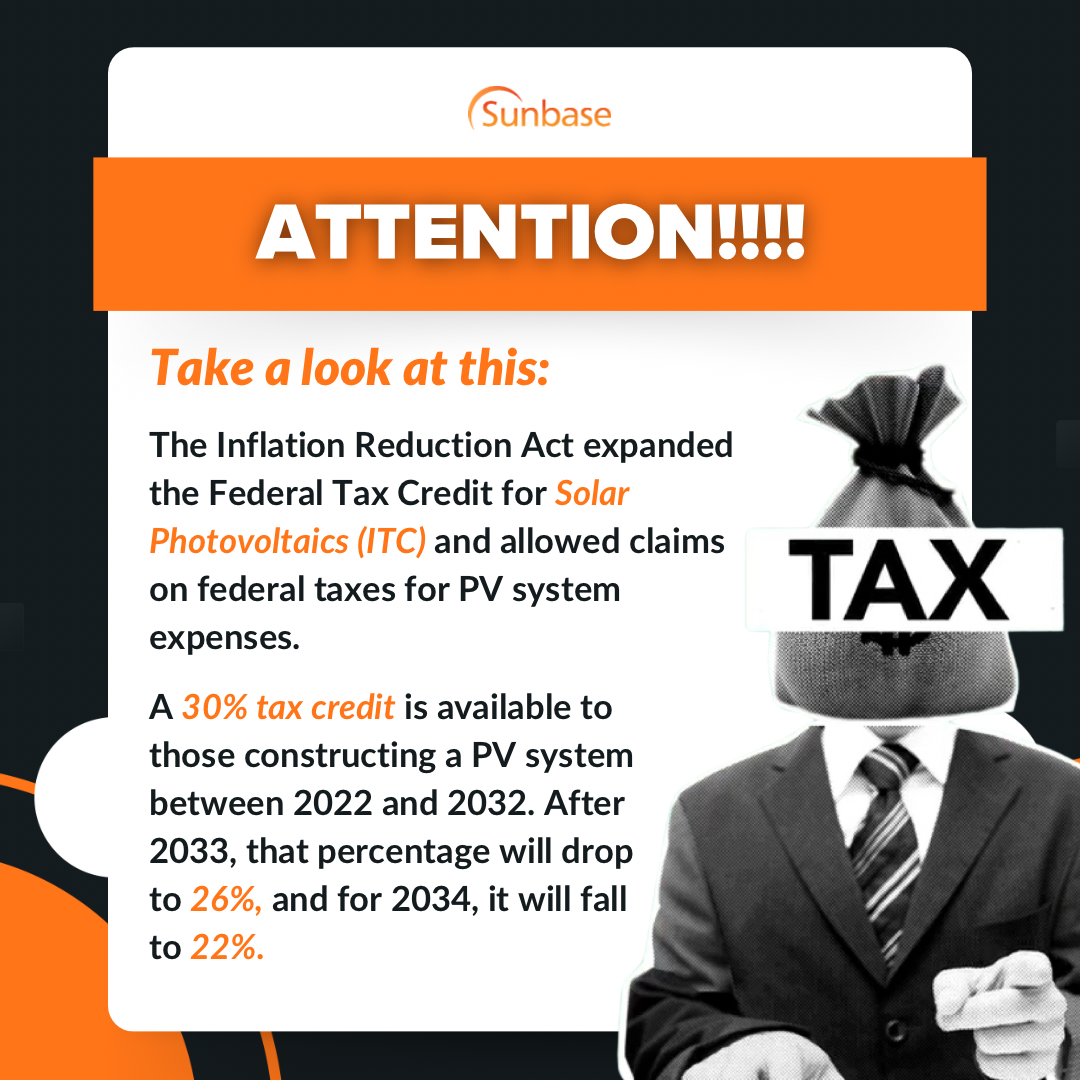
Solar businesses may greatly reduce the cost of solar energy investments by taking advantage of federal and state incentives.
President Biden approved the Inflation Reduction Act, which expanded the Federal Tax Credit for Solar Photovoltaics, often known as the Investment Tax Credit (ITC), and allowed for claims on federal income taxes for PV system expenses. (US Department of Energy)
- The duration of ITC has been prolonged, and its amount is now higher.
- A 30% tax credit is available to those constructing a PV system between 2022 and 2032. After 2033, that percentage will drop to 26%, and for 2034, it will drop to 22%.
- This credit greatly lowers upfront costs and speeds up payback times by covering expenses such as labor, installing solar panels, and inverters.
Challenge #5: Building Trust and Credibility
Cultivating confidence is essential, especially when addressing consumers' doubts about the benefits and reliability of solar systems.
How to Overcome?
> Transparent Communication:
Explain in detail how your solar power solutions will help clients directly, such as by lowering energy costs, improving the environment, or raising the value of their homes. Share what makes your company special and the great benefits you offer your customers!
> Testimonials and Case Studies
Presenting actual success stories and customer testimonials can help you establish credibility and clearly illustrate the worth and dependability of your offerings.
Challenge #6: Managing a Lengthy Sales Cycle
The solar sector often has a lengthy sales cycle due to the significant costs involved and the need for thorough customer education.
If you navigate this period thoughtfully, you can prevent potential lost sales and support your customers effectively!
How to Overcome?
> Using CRM tools
Handling customers simplified! A Customer Relationship Management (CRM) system helps improve the
sales process by tracking leads, managing customer contacts, and automating follow-ups. This guarantees that no possible client goes unnoticed during the prolonged decision-making process.
> Offering interactive calculators to show potential savings
Calculations lead to better decisions.
Interactive savings calculators on your website help potential consumers see how their savings can grow over time. This engaging tool not only captivates users but also inspires them to proceed with your company!
> Creating drip email campaigns
Create drip email campaigns that gradually cultivate leads by offering insightful details on renewable energy, financing alternatives, and incentives.
These advertising efforts assist prospects in making decisions and keep your brand at the forefront of their minds.
How Can Solar Companies Overcome Marketing Obstacles With Sunbase?
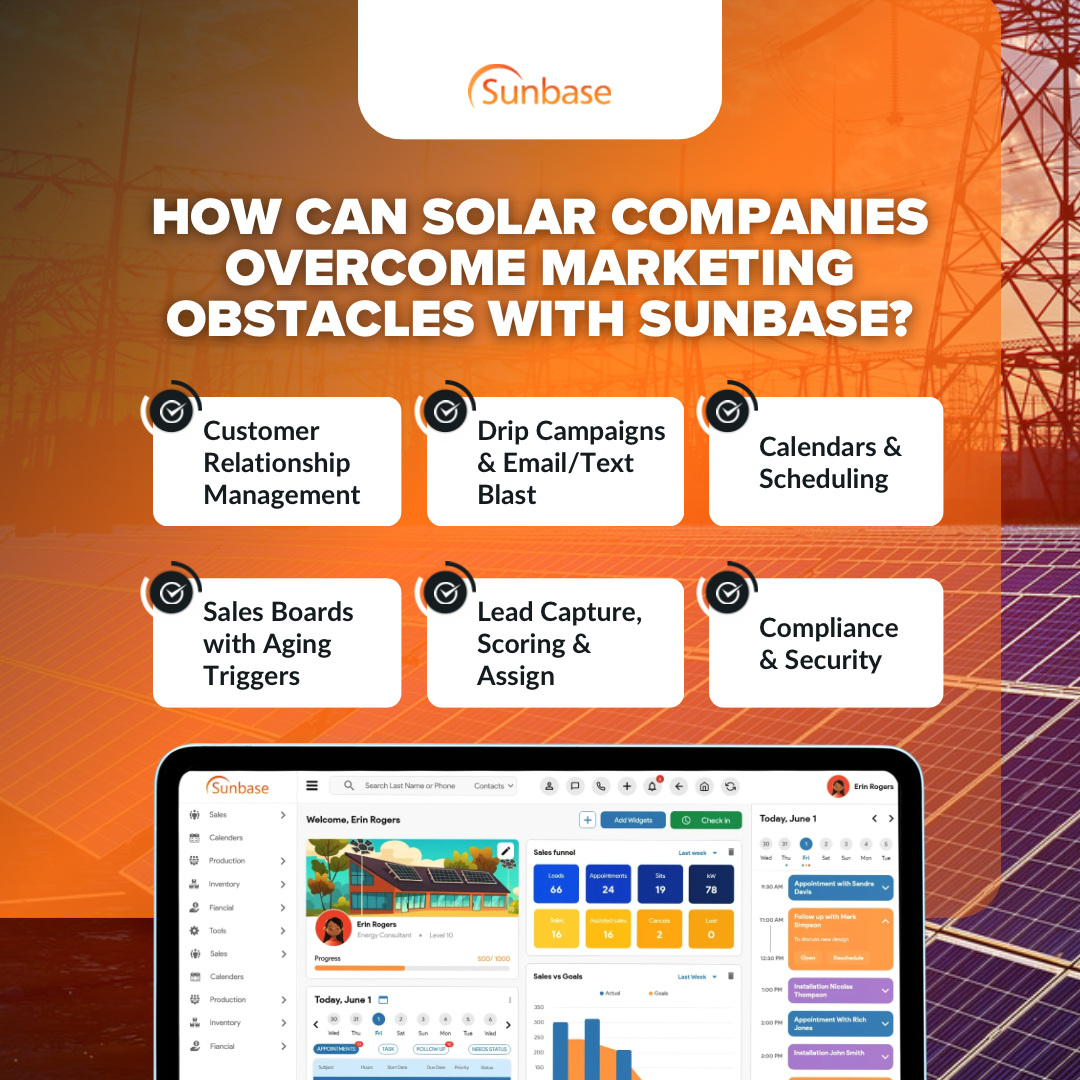
Here's how:
1. Customer Relationship Management
Record, arrange, and maintain crucial client and prospect information so that it is available at all times and on all devices.
With Sunbase, solar companies can connect with their clients like never before. They can monitor conversations, follow up easily, and ensure that every potential lead gets the attention it deserves!
Read our blog for Understanding Solar CRM: A Beginner’s Guide.
2. Drip Campaigns & Email/Text Blast
Have you ever wished you could be everywhere at once, sending tailored messaging to each lead? Now you can!
Keeping in touch with potential customers is made simple with Sunbase's drip campaigns and email/text blasts. To keep leads interested and warm, send individualized communications and automate follow-ups.
3. Calendars & Scheduling
How about transforming the hectic scheduling process into a simple, uncomplicated one?
Easily plan meetings and filter calendar displays by appointment type, territory, or user. Sunbase's integrated calendars and scheduling capabilities ensure you never forget an appointment or accidentally double-book a meeting. Keep your clients satisfied and your staff well-organized.
4. Sales Boards with Aging Triggers
It's time to have a scoreboard that monitors your sales and notifies you before a lead becomes cold.
Aging triggers on Sunbase's sales boards help your team keep on top of things by highlighting leads that require attention. Take appropriate action to boost conversions.
5. Lead Capture, Scoring & Assign
Now, you can capture, score, and assign leads without getting lost in the maze of work.
Send leads from Google, Facebook, suppliers, and company-generated sources straight into the CRM. To ensure a prompt and successful follow-up, efficiently score and assign leads to the appropriate representatives.
6. Compliance & Security
Are you concerned about data? Rest at ease because Sunbase protects your information for you!
Through strong data management and encryption procedures, Sunbase improves the security of customer information and guarantees adherence to data protection laws, protecting both your company's reputation and your client's trust.
Personalization begins with the process. See how Sunbase’s proposal tools help customize solar solutions based on unique customer needs.
In a nutshell
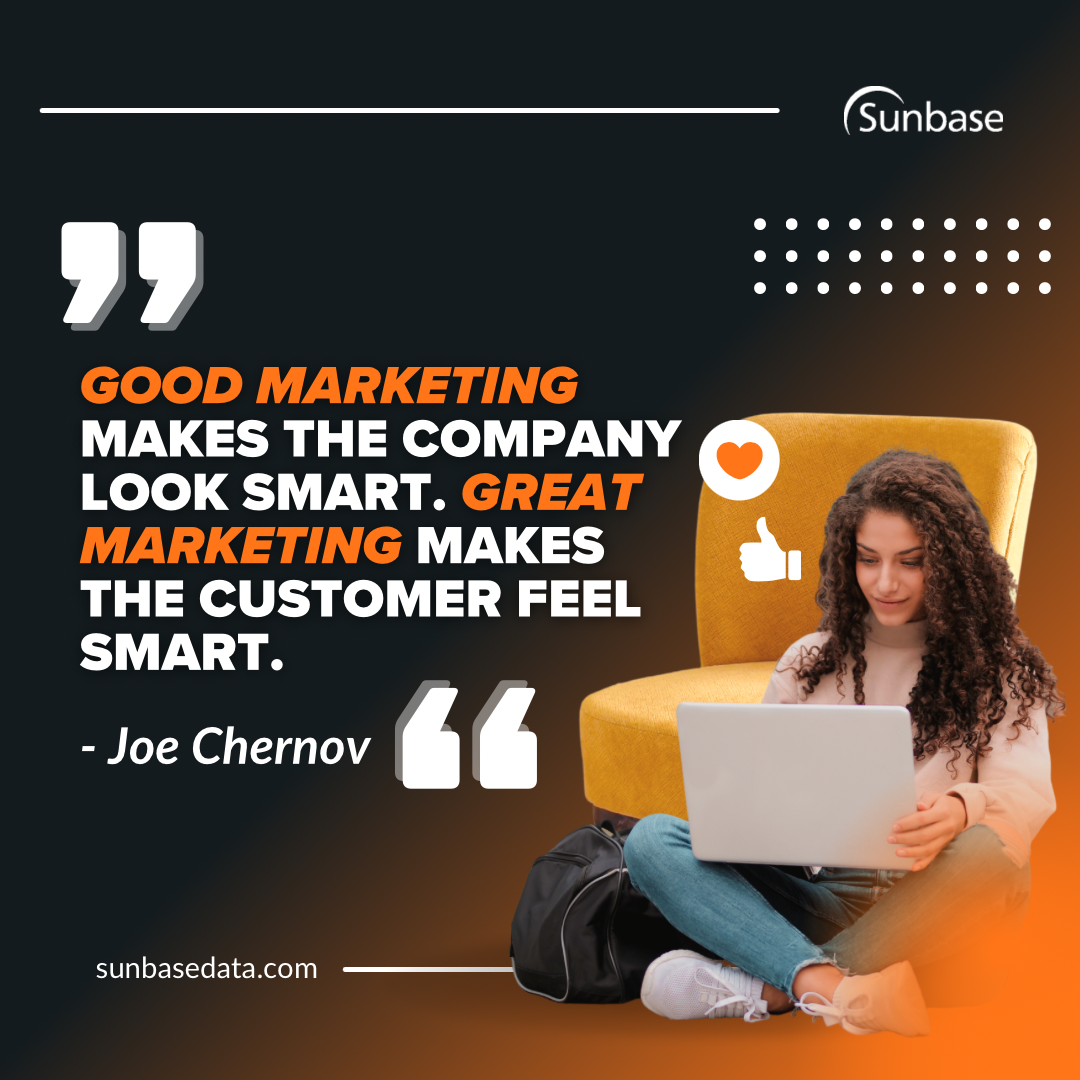
“Good marketing makes the company look smart. Great marketing makes the customer feel smart.”- Joe Chernov
When equipped with the knowledge and confidence to make wise decisions about solar energy, customers become brand ambassadors, boosting loyalty and trust.
Ensuring your clients believe they have made the best choice, one that positively impacts both the environment and their wallet, is the key to success.
Discover More About Sunbase
Tired of the same old roadblocks? It's time to break down boundaries and transform your marketing approach!
Sunbase bridges the gap between your business and customers. Contact Us for a Personalized Demo now!
FAQ's
What methods can solar manufacturing companies use to monitor investment return and control marketing expenses?
Solar manufacturing companies can maximize their marketing budgets by focusing on high-impact tactics like SEO and content marketing. They can also use analytics tools to monitor the return on investment of their marketing activities.
In what ways do case studies and testimonials aid solar installers in their marketing campaigns?
Social proof, such as case studies and testimonials, enables prospective buyers to observe the practical advantages of solar energy. This can boost confidence and the possibility that clients will select a specific solar installer.
What’s the most effective marketing strategy for solar?
A mix of local SEO, referrals, and personalized proposals — powered by smart automation from a solar CRM like Sunbase.
One Platform. Zero Chaos. Run Your Entire Business in One Place.
Sunbase replaces your CRM, proposals, scheduling, job tracking, and reporting tools — all inside one clean, connected platform.
About Sunbase
The All-In-One Platform to Run Your Entire Business
Sunbase helps you organize operations, streamline daily workflows, and manage everything - from first customer contact to final project deliver- in one connected system.
Our Mission
- Organize your business.
- Optimize your workflow.
- Automate what slows you down.
Why Businesses Choose Sunbase
One Connected Workflow
Replace scattered tools and manual processes with a single platform that brings together your team, tasks, customers, jobs, and performance data.
🌎 Global Presence
Serving the United States, Canada, India, LATAM, Australia, and 10+ international markets.
👥 11,000+ Users
Trusted by contractors, installers, project managers, sales teams, and field technicians.
🏗️ Built for All Sizes
From small contracting teams to fast-growing enterprises, Sunbase adapts to your workflow.
Useful Links For You
Stop Managing Your Business Manually. Automate It.
Sunbase automates workflows, reduces mistakes, and helps your team get more done - without hiring extra staff or juggling multiple tools.



